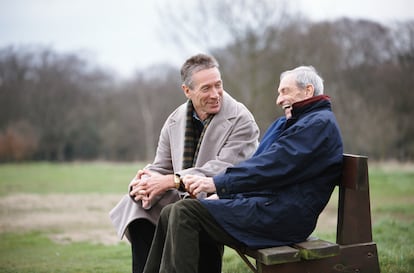Why is it so difficult to forgive, especially our parents?
Letting go of deep hurt by incorporating the process of forgiveness is very beneficial for health and well-being, even if the wrongs come from the people you love most


Many circumstances expose us to being hurt, from the most mundane situations like pushing and shoving on the subway, a nasty look at a store or a co-worker’s malicious comments, to the most complex ones like betrayal, abuse, rejection or insensitivity by even the closest family members. The fact is that our parents — and anyone else — can consciously or unconsciously hurt us in many different ways. But in all cases, there are only two options: to forgive truly and deeply, or to decide not to and hold on to bitterness, anger and resentment.
Why is forgiveness so complicated? Why is it important to forgive? How can one actually do it? Forgiving means repeatedly remembering a past event that caused a lot of suffering. “Forgiving a person who has hurt you is never easy, but dwelling on those events and constantly reliving them can fill one’s mind with negative thoughts and repressed anger,” says Tyler VanderWeele, PhD, an epidemiologist and professor at the Harvard TH Chan School of Public Health, in the most recent and comprehensive study on forgiveness, which was published in March 2023 at the Center for Open Science (COS). Conducted from the perspective of several disciplines, the study shows that when forgiveness is taught, practiced and actually achieved, the result is a high level of mental, emotional and physical well-being, and it also reduces the symptoms of anxiety and depression. “When you learn to forgive, you are no longer trapped by the past actions of others and can finally feel free,” VanderWeele explains in the article.
Clinical psychologist Everett L. Worthington, a professor in the Department of Psychology at Virginia Commonwealth University and a co-author of the study, tells EL PAÍS how forgiveness can change the dynamics of relationships and improve many things in society. “There are injustices that we experience every day, and people do not have to forgive, but it is a choice that can be made or not. In the article, we highlight two types of forgiveness: the first is making the decision to treat the offending person differently, as a valuable person, without seeking revenge, and the second type is emotional forgiveness, which consists of replacing negative emotions such as hatred and frustration with positive emotions toward the other person like empathy, sympathy, compassion and love.”
Worthington says that in order to conduct some of the research, participants carried out exercises from a workbook. Researchers discovered that on average, it takes only three to 3.5 hours to go through the process of forgiveness. “We can free ourselves from suffering if we make the decision to reach emotional forgiveness; this practical workbook gets us working and through the process in a very short time,” Worthington observes. However, it is important to clarify what forgiveness really means and whether we really want to do it or not.
What forgiveness is and is not
The American Psychological Association (APA) states that forgiveness involves voluntarily letting go of feelings of resentment toward someone who has done you wrong, been unfair or hurtful, or harmed you in some way. It entails a voluntary change in feelings, attitudes, and behavior so that one is no longer dominated by resentment and can express compassion, generosity and similar feelings toward the person who hurt him or her.

“Forgiveness means understanding how to free ourselves from actions and the need to act in response to deep anger, discomfort and instead react from a state of awareness, clarity and a deep understanding of things,” explains Daniel Lumera, a biologist, Italian professor, meditation teacher and forgiveness expert. But he adds an important nuance: “The dynamics of forgiveness cannot be generalized, they are unique. Sometimes it is easier to integrate forgiveness of one’s parents because they are part of a more intimate process of defining our identity; we are more motivated to forgive them because they inspire in us feelings of unconditional love.”
Unai Aso, a cognitive behavioral psychologist at the online psychology company Buencoco, adds that forgiveness serves as a functional coping mechanism. “It acts as a form of releasing past resentments and grudges, allowing the person to move forward. The process of forgiving parents can differ significantly from forgiving other people because of the unique nature of the parent-child relationship,” he adds. “I have seen many cases where it is much more difficult to forgive a person far removed from the nuclear family, but the opposite can also happen, since one does not expect such tremendous hurt from a parent; therefore, it is much more complicated to forgive because the pain is stronger,” says Daniel Lumera. Thus, the expert says that forgiveness is an act of courage and not a sign of weakness. “As a society, we think that forgiveness is a useless act, but the opposite is true. It can transform the quality of our lives in incredible ways,” he emphasizes.
Four key universal steps to forgiveness
Daniel Lumera sums up the four universal steps to forgiveness, a method he uses in schools and prisons and even with people who are dying.
- Statement. “I must state what I feel, and what I think very seriously, and make it an honest and conscious exercise. Saying, ‘I forgive you because you betrayed or abandoned me,’ is actually a conscious accusation, so you can practice it without the person being there in front of you and get in touch with your deep pain that way. This is a very powerful way of letting go, being aware of what we feel, manifesting it, expressing it, being close and taking care of ourselves,” says Lumera.
- Responsibility. “I have to understand that I myself originate what I feel. If I am at peace within, nobody can make me angry. I have to take responsibility for what I feel, because, just as I originate it, I can change it and transform it, since the source is internal,” he notes.
- Gratitude. This allows us to recognize the value of what we have. “I am grateful because I have a roof over my head, food, support, etc... Every day, we can recognize people, things and situations and value what we have, seeking it and exploring it,” he explains. “How much have we integrated our past? If I become grateful for something, and I have been able to grow and evolve from what happened, I can be happy because of everything that has happened. I have integrated it and I have been able to evolve,” he says.
- Love. “It is a state of inclusive consciousness where the rupture between the self and the other person is dissolved, annulled and healed, because I re-integrate the event within myself, and I experience it again from a place of reconciliation,” he concludes.
Sign up for our weekly newsletter to get more English-language news coverage from EL PAÍS USA Edition
Tu suscripción se está usando en otro dispositivo
¿Quieres añadir otro usuario a tu suscripción?
Si continúas leyendo en este dispositivo, no se podrá leer en el otro.
FlechaTu suscripción se está usando en otro dispositivo y solo puedes acceder a EL PAÍS desde un dispositivo a la vez.
Si quieres compartir tu cuenta, cambia tu suscripción a la modalidad Premium, así podrás añadir otro usuario. Cada uno accederá con su propia cuenta de email, lo que os permitirá personalizar vuestra experiencia en EL PAÍS.
¿Tienes una suscripción de empresa? Accede aquí para contratar más cuentas.
En el caso de no saber quién está usando tu cuenta, te recomendamos cambiar tu contraseña aquí.
Si decides continuar compartiendo tu cuenta, este mensaje se mostrará en tu dispositivo y en el de la otra persona que está usando tu cuenta de forma indefinida, afectando a tu experiencia de lectura. Puedes consultar aquí los términos y condiciones de la suscripción digital.








































